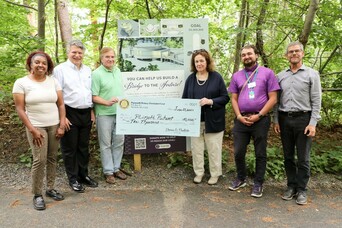Rotary Club of Plymouth Makes Donation to Plimoth Patuxet’s Indigenous Program Building Project
Generous gift will support the Museum’s goal to expand Indigenous Exhibits and Programs
Plimoth Patuxet Museums is pleased to announce a $10,000 donation from the Rotary Club of Plymouth in support of its Indigenous Program Building Project.
Plans and fundraising are underway to expand the Museum’s Indigenous Program with the addition of a modern building that will enable staff to better tell the compelling story of profound change and cultural persistence in the Indigenous homeland in this region. The new building features an amphitheater and exhibit space that can provide year-round programming. The Museum will break ground as soon as fundraising for the project is complete.
“We are tremendously grateful to the Rotary Club of Plymouth,” said Ellie Donovan, Executive Director of Plimoth Patuxet Museums. “This generous donation is a perfect alignment between the Museum’s educational mission and Rotary’s commitment to supporting community projects that serve the public.”
Brad Lopes, the Museum’s Director of Wampanoag and Indigenous Interpretation and Training, appreciates the Rotary Club’s investment in a project that will further illuminate Indigenous history, culture, and traditions. “Thank you for sharing in the vision of this project and the multifaceted, engaging way this new building will serve generations to come,” said Lopes.
“Plimoth Patuxet Museums is a preeminent cultural treasure and economic resource to this community,” said Rotary Club of Plymouth’s Charitable Giving Chair, Joe Balboni. “As a long-time supporter of Plimoth Patuxet’s mission, we are delighted to contribute to its future with this gift.”
Rotary Club of Plymouth is part of Rotary International, a 110-year-old global network with 1.2 million members whose stated purpose is to bring together business and professional leaders in order to provide humanitarian services, encourage high ethical standards in all vocations, and to advance goodwill and peace around the world. It is a non-political and non-sectarian organization open to all people regardless of race, color, creed, religion, gender, or political preference.
To learn more about this project and the many ways to help with its completion, contact Plimoth Patuxet's Development office by email at development@plimoth.org or by calling (508) 503-2668.

At the site where Plimoth Patuxet Museums’ new Indigenous Program Building will be located, Plymouth Rotary Club’s President James Milch presents a donation check to the Museum’s Executive Director Ellie Donovan. They are joined by Malissa Costa, Manager of the Museum’s Historic Patuxet Homesite; Joe Balboni, Plymouth Rotary Club’s Charitable Giving Chair; Brad Lopes, the Museum’s Director of Wampanoag and Indigenous Interpretation and Training; and Rob Kluin, the Museum’s Director of Marketing & Communications.
About Plimoth Patuxet
Plimoth Patuxet is one of the Nation’s foremost living history museums. Founded in 1947, the Museum creates engaging experiences of history built on thorough research about the Indigenous and European people who met along Massachusetts' historic shores in the 1600s. Major exhibits include the Historic Patuxet Homesite, the 17th-Century English Village, Mayflower II, and Plimoth Grist Mill. A private, 501(c)(3) not-for-profit educational institution, Plimoth Patuxet is supported by admission fees, donations, memberships, and revenue from educational programs, gift shops and dining. Plimoth Patuxet receives support from private foundations, corporations, and local businesses. Located less than an hour’s drive south of Boston, and 15 minutes north of Cape Cod, the Museum is open daily from early spring through the Sunday after Thanksgiving. For more information, visit plimoth.org. Follow the Museum on Facebook, Instagram, TikTok, YouTube, and X/Twitter.